Related Research Articles

Romansh is a Gallo-Romance language spoken predominantly in the Swiss canton of the Grisons (Graubünden). Romansh has been recognized as a national language of Switzerland since 1938, and as an official language in correspondence with Romansh-speaking citizens since 1996, along with German, French, and Italian. It also has official status in the canton of the Grisons alongside German and Italian and is used as the medium of instruction in schools in Romansh-speaking areas. It is sometimes grouped by linguists with Ladin and Friulian as the Rhaeto-Romance languages, though this is disputed.

Switzerland, officially the Swiss Confederation, is a landlocked country located at the confluence of Western, Central and Southern Europe. It is bordered by Italy to the south, France to the west, Germany to the north and Austria and Liechtenstein to the east.

The four national languages of Switzerland are German, French, Italian, and Romansh. German, French, and Italian maintain equal status as official languages at the national level within the Federal Administration of the Swiss Confederation, while Romansh is used in dealings with people who speak it. Latin is occasionally used in some formal contexts, particularly to denote the country.

Ticino, sometimes Tessin, officially the Republic and Canton of Ticino or less formally the Canton of Ticino, is one of the 26 cantons forming the Swiss Confederation. It is composed of eight districts and its capital city is Bellinzona. It is also traditionally divided into the Sopraceneri and the Sottoceneri, respectively north and south of Monte Ceneri. Red and blue are the colours of its flag.
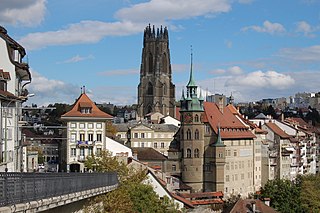
Fribourg is the capital of the Swiss canton of Fribourg and district of La Sarine. Located on both sides of the river Saane/Sarine, on the Swiss Plateau, it is a major economic, administrative and educational centre on the cultural border between German-speaking and French-speaking Switzerland. Its Old City, one of the best-maintained in Switzerland, sits on a small rocky hill above the valley of the Sarine. In 2018, it had a population of 38,365.
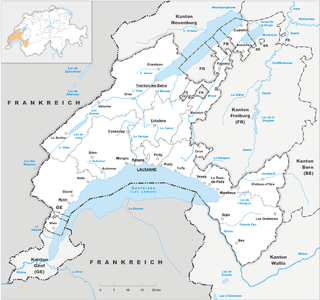
Vaud, more formally the canton of Vaud, is one of the 26 cantons forming the Swiss Confederation. It is composed of ten districts and its capital city is Lausanne. Its coat of arms bears the motto "Liberté et patrie" on a white-green bicolour.
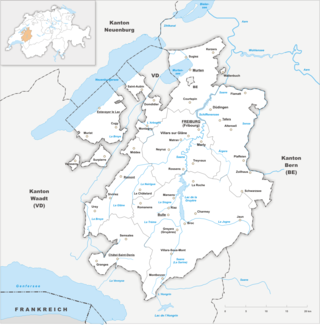
The canton of Fribourg, also canton of Freiburg is located in western Switzerland. The canton is bilingual, with French spoken by more than two thirds of the citizens and German by a little more than a quarter. Both are official languages in the canton. The canton takes its name from its capital city of Fribourg.
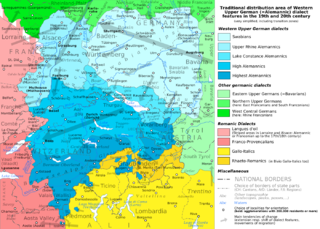
Alemannic, or rarely Alemannish, is a group of High German dialects. The name derives from the ancient Germanic tribal confederation known as the Alamanni.

The University of Fribourg is a public university located in Fribourg, Switzerland.

Fondue is a Swiss melted cheese dish served in a communal pot over a portable stove heated with a candle or spirit lamp, and eaten by dipping bread into the cheese using long-stemmed forks. It was promoted as a Swiss national dish by the Swiss Cheese Union in the 1930s, and was popularized in North America in the 1960s.
Same-sex marriage in Switzerland has been legal since 1 July 2022. Legislation to open marriage to same-sex couples passed the Swiss Parliament in December 2020. The law was challenged in a referendum on 26 September 2021 by opponents of same-sex marriage and was approved with the support of 64% of voters and a majority in all 26 cantons. The law went into force on 1 July 2022. A provision of the law permitting same-sex marriages performed abroad to be recognised in Switzerland took effect on 1 January 2022.

Romandy is the French-speaking part of western Switzerland. In 2020, about 2 million people, or 22.8% of the Swiss population, lived in Romandy. The majority of the romand population lives in the western part of the country, especially the Arc Lémanique region along Lake Geneva, connecting Geneva, Vaud and the Lower Valais.

Payerne is a municipality in the Swiss canton of Vaud. It was the seat of the district of Payerne, and is now part of the district of Broye-Vully. The German name Peterlingen for the town is out of use.
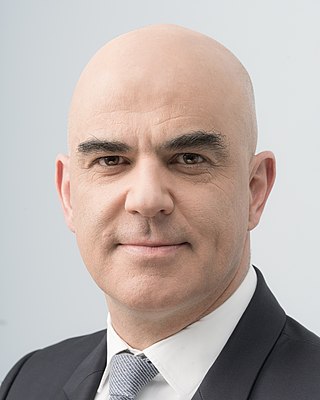
Alain Berset is a Swiss politician who has served as a Member of the Swiss Federal Council since 2012. A member of the Social Democratic Party (SP/PS), he heads the Federal Department of Home Affairs since he took office. Berset serves as President of the Swiss Confederation for 2023.

Lesbian, gay, bisexual, transgender (LGBT) rights in Switzerland are progressive by European standards. Their history is one of liberalisation at an increasing pace since the 1940s, in parallel to the legal situation in Europe and the Western world more generally. Legislation providing for same-sex marriage, same-sex adoption, and IVF access was accepted by 64% of voters in a referendum on 26 September 2021, and entered into force on 1 July 2022.
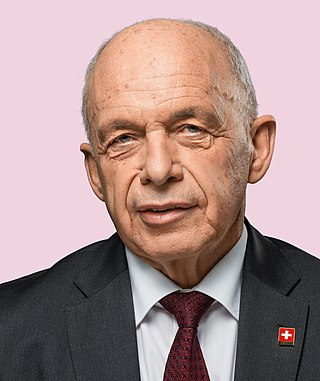
Ulrich "Ueli" Maurer is a Swiss politician who served as a Member of the Swiss Federal Council from 2009 to 2022. A member of the Swiss People's Party (SVP/UDC), he was President of the Swiss Confederation in 2013 and 2019. Formerly head of the Federal Department of Defence, Civil Protection and Sports (2009–2015), Maurer has headed the Federal Department of Finance from 2016 to 2022. Until 2022, he has been the longest-serving current member of the Federal Council since Doris Leuthard's resignation in 2018.

Women in Switzerland are women who live in and are from Switzerland. The legal and social role of Swiss women has evolved significantly from the mid-20th century onwards.
Miriam Tinguely is a Swiss artist who started painting when she was 15. Born to two well-known artists, Jean Tinguely and Eva Aeppli, she was raised by her paternal grandparents in Geneva and Bulle and rarely saw her famous parents during her childhood, though her mother supported her artistic pursuits. She took an apprenticeship with photographer Jacques Thévoz, then began to travel when she was 16.
The Fasel Gang was a group of Swiss criminals, mainly composed of Jacques Fasel, Daniel Bloch and a third sidekick, three accomplices that claimed to fight for anarchism and social justice.
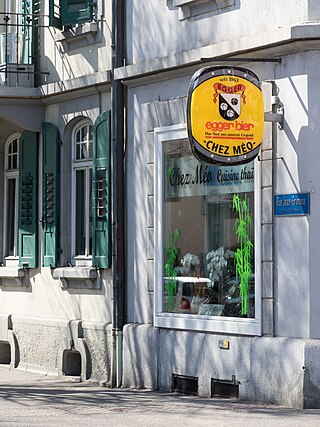
Switzerland straddles the border between the beer-loving central European countries and the wine-loving western European and Mediterranean countries and today beer is second to wine in terms of consumption among Swiss. The country has a long tradition of brewing, with significant domestic beer production and a growing craft brewing sector.
References
- 1 2 Eichenberger, Isabelle (2010-09-18). ""Nei, dasch zvüu, tu me connais!"". Swissinfo.ch (in German). Retrieved 23 April 2019.
- ↑ Harris, Molly. "The Swiss language that few know". www.bbc.com. Retrieved 23 April 2019.
- ↑ swissinfo.ch, Isabelle Eichenberger. ""Nei, dasch zvüu, tu me connais!"". SWI swissinfo.ch (in French). Retrieved 2022-12-21.
- ↑ Wijnands, Paul (2005). Le français adultère, ou, Les langues mixtes de l'altérité francophone (in French). Editions Publibook. pp. 28–30. ISBN 978-2-7483-0929-4.